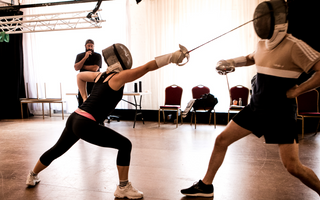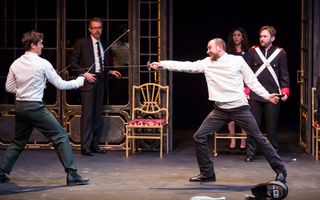 On Stage
On Stage
HAMLET
The time is out of joint: O cursed spite,
That ever I was born to set it
Act 1, Scene 5
Hamlet is the Prince of Denmark, and son of the late King Hamlet and Queen Gertrude.
Hamlet is one of four revenging sons in the play. The other three, Laertes, Fortinbras and Pyrrhus (in the play within the play) are sworn to avenge their father’s deaths and set out to do so with absolute conviction. They function as a series of counterpoints to our procrastinating hero, each offering a slightly different perspective – the bloodthirsty savagery of Pyrrhus, the pragmatic ruthlessness of Fortinbras and the thoughtless action of Laertes, set against thoughtful inaction of Hamlet. It is however too simple to say their easy access to violence is the reason Hamlet seems to us more humane. His extraordinary sense of three-dimensional humanity reveals itself in countless ways, not least in his inherent contradictions.We do not always like Hamlet and at times he alienates us deeply but every one of us recognises our feelings, doubts, pressures, and impulses in his. We attach ourselves to him because he is funny, daring, frank and has that rarest ability to witness his own mind at work, to ‘overhear’ himself and expose his conscience to us.
Shakespeare’s play expands the genre of revenge tragedy well beyond its natural bounds and explores the moral, political, and social mood of his entire age. The title character is the vehicle for this epic exploration. Academic Harold Bloom argues that Hamlet can’t kill his uncle because he simply bursts the seams of such a simple story – “Avenging a father does not require a Hamlet” (Bloom, 1990). So Hamlet’s story occupies itself with more interesting ideas. His focus is at least as much on the women in his life and on the concept of death as it is on his father and the crime he must avenge.
Hamlet’s identity as a student of Germany’s Wittenberg University is carefully defined by Shakespeare early in the play, laying the ground for the depth of his philosophical contemplation as the saga unfolds. Wittenberg was the seat of ‘humanist’ thought. The ‘humanist’ is optimistic that human understanding has endless scope and that the power of thought can be developed toward a full understanding of the purpose of life. Thought can therefore become action as we learn ‘how to act’ in our daily lives to benefit society. Hamlet is usually blindly referred to as a humanist but this may be a fundamental misunderstanding of the character. He vigorously debates ethics, metaphysics and human behaviours throughout the play, but it can be argued that he grows to reject humanism. He replaces his search for wisdom and insight with the thought that life in fact has no purpose, and an acceptance that death cannot be understood, only experienced. Bloom says that Hamlet comes to recognise that “no act but suicide is rational” (1990). In his most famous speech he debates the merits of “thought” and “action” and finds that the former poisons the latter, turning it “awry”.
In many ways, Hamlet is the story of a young man we never get to know. When we meet him, his natural personality has already been eclipsed by circumstance and he will only plummet further into disillusionment as the play continues. He is a man of disappointed hopes and unrealised potential, as is recognised by many around him. Many scholars go so far as to say his life, and even his revenge, is a failure. Ophelia paints him in her memory as the very model of a courtier, soldier and scholar, “the glass of fashion and the mould of form, the observed of all observers” (Act 3, Scene 1). Claudius knows he is “loved of the distracted multitude” (Act 4, Scene 3). He is the “noble youth” (Act 1, Scene 5) of his father. Even Fortinbras believes he would have “proved most royal” (Act 5, Scene 2) on the throne of Denmark. Unfortunately, the man we meet is “quite, quite down” (Act 3, Scene 1). But we do see glimpses of this ‘former Hamlet’ – loving, full of humour and zest for life. His initial reaction to seeing his old friends Rosencrantz and Guildenstern, his sheer joy in welcoming the players to court and his egalitarian fascination with the gravedigger’s trade remind us of how much this young man has been transformed by his ordeal.
He can no longer be who he was because he no longer believes in what “man” can be. He has lost faith in the image of people as being “noble in reason, infinite in faculty…in action, how like an angel, in apprehension, how like a god, the beauty of the world, the paragon of animals…” (Act 2, Scene 2). He, with the rest of us, is merely a “quintessence of dust” (Act 2, Scene 2) and this bleak instinct reveals itself to him very early in the play. He has lost faith in women through his mother’s “frailty”; he has lost faith in the “stale and unprofitable uses of this world” (Act 1, Scene 2) and he argues that an individual will “take corruption” from the mere “stamp of one defect” (Act 1, Scene 4).
His great contradictions, such as his paralysis in revenging his father as opposed to his wild rashness at the ‘wrong’ moments, are what give the play its eternal appeal. He sets out to prove the word of a ghost – that in itself reveals a great deal about the problem of being ‘Hamlet.’
CLAUDIUS
O, my offence is rank it smells to heaven.
Act 3, Scene 3
Claudius is Hamlet’s uncle, the brother of the late King Hamlet, and the new King of Denmark after marrying Queen Gertrude.
Typical of Shakespeare’s great villains, Claudius is a thoroughly human, flawed, interesting, three-dimensional character. Claudius is Hamlet’s antagonist who, through a combination of his lust for power and his love for his brother’s wife, has committed “the primal eldest” crime, “a brother’s murder.” (Act 3, Scene 3) He is contrasted starkly with his noble warrior brother as a shrewd and cunning political animal, and according to Hamlet he is a drunk and a man at the mercy of sensual impulses.
Claudius is a worthy opponent for Hamlet through his intelligence, his power of perception and his ability to manipulate language. Shakespeare gives him sophisticated rhetorical speeches that charm, persuade and overwhelm those around him. His first speech (Act 1, Scene 2) to the court magnificently deals with a major personal controversy (his marriage), a major political threat (Norway) and the requests of two significant courtiers (Laertes and Hamlet) with effortless skill. He charismatically greets and employs Rosencrantz and Guildenstern. He instinctively recognises Hamlet is not mad. He holds a personal discourse of forgiveness with God in the chapel, displaying guilt for the murder of his brother, but is unwilling to give up what he has gained from the murder. He manipulates the furious and grieving Laertes for his own personal gain.
Claudius stifles all attempts at maternal feeling from Gertrude towards Hamlet. He disregards the danger Gertrude was in when he hears of Polonius’ murder, and simply says “Gertrude, do not drink” (Act 5, Scene 2) when she picks up the poisoned goblet during the duel. But his affection for Gertrude and desire to preserve her feelings also sees him make the mistakes that condemn him. He tells Laertes that Gertrude is “so conjunctive to my life and soul, that as the star moves not but in his sphere, so I could not but by her” (Act 4, Scene 7). He could have disposed of Hamlet legally and publicly for the murder of Polonius, but Gertrude’s desperate pleas will not allow it. Instead he tries an underhanded political machination with the English King which fails. Again to ensure “that even his mother shall uncharge the practice and call it accident” (Act 4, Scene 7), he hatches a complex revenge for Laertes to carry out, rather than let him simply attack and kill Hamlet. Again the margin for error exposes and destroys him.
GERTRUDE
O Hamlet, thou hast cleft my heart in twain.
Act 3, Scene 1
Gertrude is Hamlet’s mother, the wife of the late King Hamlet, and the Queen of Denmark. She is the new wife of Claudius.
For a character that is so central to the entire action, Gertrude has comparatively little to say and reveals little about herself. We cannot be certain about any of her relationships. Was she happy with her former husband, the warrior and empire builder? Is she part of the reason Claudius killed old Hamlet, or did she marry him purely for the political safety it offers them both? Do her loyalties shift away from Claudius to Hamlet in the final scenes of the play? We do know that this fascinating woman is deeply loved by three very different and very remarkable men, and that she loves her son dearly. Gertrude is clearly torn between her love and concern for Hamlet, and her duty as Queen and wife to Claudius.
Many fine actors have seen these negotiations as opportunities rather than obstacles and created wonderfully interesting visions of the Danish Queen. Part of the challenge is that Gertrude only has three brief moments alone with her husband in the entire play, and these are generally moments of crisis.
The words of other characters often provide signposts to our understanding of Gertrude. In Gertrude’s case, the descriptions we receive of her come primarily from Hamlet and the Ghost of her late husband. Shakespeare does not give us first-hand evidence of her sexual licentiousness or any lack of virtue.
It is what is unsaid that Is most intriguing about Gertrude. She has chosen to suppress a great deal of personal agony and shame in her remarriage, storing it away in her soul as “black and grained spots that will not leave their tinct” (Act 3, Scene 4). Hamlet’s verbal daggers drag them mercilessly to the surface through his attack in the ‘closet scene’. It is from this moment that her journey of self-knowledge begins.
Gertrude is an experienced regal figure with natural authority, as she demonstrates in her easy public diplomacy with Rosencrantz and Guildenstern, her quip at Polonius for “more matter with less art” (Act 2, Scene 2), and her quick and accurate explanation of Hamlet’s wildness at Ophelia’s grave. Privately however, she continues to suppress life’s more difficult emotions, refusing to acknowledge pain in herself or others, as she shows in refusing to speak with the mad Ophelia. But again, after Ophelia’s tragic drowning, her poise and control are remarkable, rendering a lyrical and moving account of Ophelia’s death. In her own death, she uses her last breaths to warn Hamlet of the poisoned cup, showing her dedication to him.
THE GHOST
I am thy father's spirit,
Doom'd for a certain term to walk the night…
Act 1, Scene 5
The Ghost is the late King Hamlet, Hamlet’s father, and Gertrude’s first husband.
Introduced as a terrifying figure “in arms”, he lives up to his aura in his first blunt exchange with Hamlet on the battlements. “Mark me… pity me not… so art thou to revenge” (Act 1, Scene 5) are the words of a man on a mission, refusing to admit any sentiment or paternal feeling to the situation. But the spectral warrior’s mask soon slips away to reveal a flesh and blood human being, frail, flawed and “honest” (Act 1, Scene 5).
The audience, like Hamlet, is exposed to a vision of utter torment. The fires of purgatory seem to hurt this man less than his brother’s crime and his wife’s decision to move on after his death – “O Hamlet, what a falling off was there” (Act 1, Scene 5).
The Ghost urgently fulfils his objective to secure a promise of revenge from Hamlet. By the end of the scene there is a powerful and utterly convincing relationship between a father and son. The reality of their former living relationship or their family life is never made clear. Hamlet paints it as idyllic – “so loving to my mother that he might not beteem the winds of heaven visit her face too roughly” (Act 1, Scene 2). But Gertrude interestingly offers no opinion whatsoever of her former life, not even responding to Hamlet’s long list of his father’s virtues in the closet scene. We get two other portraits of him. One of his militarism and skill – the “valiant” (Act 1, Scene 1) warrior defeating old Fortinbras in battle and slaying the “sledded Polacks on the ice” (Act 1, Scene 1), takes us back to the Viking saga world from which the original play sprang. Hamlet carefully constructs the image of the loving, empathetic and wise King Gonzago, murdered in The Mousetrap.
Most academics argue that Shakespeare deliberately creates a medieval father giving his ‘modern’ philosopher son a task too thoughtlessly simple and primitive for him to carry out. The father and son, the armoured soldier and the student, in conversation on the misty castle battlements is one of the theatre’s great images.
OPHELIA
O, what a noble mind is here o'erthrown!
Act 3, Scene 1
Ophelia is intelligent and has a keen wit as she demonstrates with Laertes. Her songs and sharp cynicism in her mad scenes suggest that she has some life experience, at least more than her father realised. She is trusting of her father and Hamlet, whether that is wise or not.
Ophelia shows warmth and tolerant maturity in response to her brother’s thoughts about her virginity and relationship with Hamlet. Having already secured a promise from her, Laertes says “Ophelia, remember well what I have said to you” (Act 1, Scene 3) Polonius overhears this and asks what Laertes has said and Ophelia’s personal affairs become her father’s business.
She falls victim to Hamlet’s profound distrust of women. Not only does he berate her brutally with pleas and orders to hide herself in a nunnery from the inevitable evils of being female; he also fails to trust her with his dilemma. Horatio is allowed to share in the information Hamlet carries from the ghost, but Hamlet does not share this information with Ophelia.
Ophelia’s grief for her father’s death, and perhaps grief over Hamlet’s treatment of her, turns to madness. In her famous ‘mad scene’, by handing out flowers with their accompanying meanings, Ophelia in a way gives Polonius the funeral he never had. Her relationship with Hamlet appears to rear its head in this scene in her words, amidst her mourning – “young men will do it if they come to it, by cock they are to blame” (Act 4, Scene 5). No certain conclusions can be drawn from much of what Ophelia says but great tension and pathos is generated by it. Shakespeare’s skill and insight is revealed in Ophelia’s mental shifts, as she slips between thoughts of father, brother, and lover as if they are one man.
In her ‘madness’ Ophelia says, “we know what we are, but know not what we may be” (Act 4, Scene 5), which seems a reasonable portrait of her story of love and loss in Hamlet.
POLONIUS
I hold my duty, as I hold my soul,
Both to my God and to my gracious king…
Act 2, Scene 2
Polonius is a royal advisor to the palace, and the father of Ophelia and Laertes.
Polonius is an interesting paradox, a seemingly comic figure who is in some ways responsible for the events of the play. He fits the comic caricature of a petulant and self-interested old busy body, wanting to preserve his daughter’s virginity and his family name. In this guise, he provides some of the play’s best comedy, but he also explodes such clichés through moments of humanity and genuine danger. He is not a harmless figure, he hurts others and is killed himself, and the destruction of his family is essential to play’s tragic shape.
Shakespeare’s audience would have recognised in Polonius a clever and topical satirical portrait of William Cecil or Lord Burleigh, a cunning and powerful advisor to Queen Elizabeth. In modern productions Polonius’ identity is more often equated with that of a prime minister within an elected and governing monarchy. He is certainly a key adviser to Claudius’ court and comes and goes freely from the seat of power. He even feels free to enter the Queen’s private chamber and tell her to “be round with” (Act 3, Scene 4) her son. Hamlet mercilessly mocks him, and Claudius and Gertrude gently do the same.
Polonius makes some of the most significant decisions in the play – ordering the end of Ophelia’s relationship with Hamlet, using his daughter as a pawn to diagnose Hamlet’s madness, encouraging the King and Queen to attend the ‘Murder of Gonzago’, and spying on Hamlet in the closet. His death marks the climactic turning point of the play. From that moment, the entire arc of revenge is tipped sideways and leads to the demise of almost every key figure in the play.
Polonius parents his two children completely differently. He offers fatherly advice and wisdom to Laertes as he departs for adventures in France “to thine own self be true…” (Act 1, Scene 3). Yet he asserts his control over Ophelia’s actions and even her thoughts (“Think yourself a baby” – Act 1, Scene 3) completely outlawing any agency she has over her own life or relationships. He does not approve of Ophelia’s relationship with Hamlet and questions it constantly, eventually ordering her not to see Hamlet at all.
LAERTES
Let come what comes; only I’ll be revenged
Most thoroughly for my father.
Act 4, Scene 5
Laertes is Polonius’ son and the brother of Ophelia.
Laertes is established in immediate opposition to Hamlet from the opening of the play. Both young men have requested leave of the new King to return to their former lifestyles, in France and Wittenberg respectively. Status would suggest Hamlet’s bid should be addressed first but Claudius skips him and offers generous and expansive permission to Laertes to let “time be thine and thy best graces, spend it at thy will” (Act 1, Scene 2). Such largesse is then buried as he forcefully insists Hamlet remain “here, in the cheer and comfort of our eye” (Act 1, Scene 2).
When we next meet Laertes, the fateful opposition between the two men deepens. From his perspective on the nature of men’s sexual appetites, he advises his sister to reject Hamlet’s advances, which he calls a “fashion and a toy in blood” (Act 1, Scene 3). Moments later we hear the same controlling and mistrustful voice from his father, rejecting Ophelia’s desperate claims that Hamlet’s love is of “honourable fashion” (Act 1, Scene 3).
Later, it is Ophelia who re-introduces Laertes to the story. In her madness after Polonius’ death, she offers the King and Queen a dangerous premonition – “my brother shall know of it” (Act 4, Scene 5), and soon after Laertes returns enraged to Elsinore. Ophelia’s death stalls Laertes’ wave of revenge and his passion and affection for his sister is movingly portrayed in his attempts to communicate with her, “O rose of May, dear maid, kind sister, sweet Ophelia” (Act 4, Scene 5). At her graveside he shows a genuine and heroic passion for her, begging to be buried with her.
Shakespeare uses Claudius to demonstrate the different capacities for revenge in the play’s two young heroes. Hamlet could not cut a man’s throat in the church. Laertes can do so without hesitation. Hamlet can instinctually recognise when someone is playing games with him. Laertes, consumed by emotional fury, is easily manipulated by the King to kill Hamlet against his conscience and his natural instinct for honour.
In death, Laertes reveals Claudius’ plan to Hamlet and begs for his forgiveness, which Hamlet agrees to, making peace at the end of both young men’s lives.
HORATIO
I am more an antique Roman than a Dane…
Act 5, Scene 2
Horatio is Hamlet’s closest friend.
Horatio’s importance to the story is often neglected. He introduces and finishes the story. He shares Hamlet’s intelligence and humanist philosophical cynicism. Horatio brings his friend the news of the Ghost with the sincerity and sensitivity that comes to mark every aspect of his behaviour. From the outset then, Horatio’s rational thinking and action, his stoic emotional balance and his cool-headed appreciation of justice superbly counterweight Hamlet’s capacity for rashness, emotional overstatement and cruelty. Horatio is the unflinchingly loyal and self-sacrificing best friend that Shakespeare uses in so many of his plays.
Horatio senses danger whenever Hamlet’s “wild and whirling” (Act 1, Scene 5) passions start to consume him. He warns his friend that the Ghost may “tempt him toward the flood” (Act 1, Scene 4), he is bewildered that Hamlet will not trust him with the Ghost’s words. Horatio promises to observe Claudius’ guilt during the play and no doubt watches with some despair as a crazed Hamlet almost sabotages the whole event.
Horatio is aware that there is something morbidly amiss with him. Hamlet’s fascination with the dead and physical decay troubles Horatio – “it is to consider too curiously to consider so my lord” (Act 5, Scene 1). Hamlet expresses to Horatio that he holds him “in his heart’s core” because he is “not passion’s slave” (Act 3, Scene 2). The news that Hamlet has sent Rosencrantz and Guildenstern to their deaths shocks Horatio. As always, he says little (“So Rosencrantz and Guildenstern go to’t” – Act 5, Scene 2) but two things give away his attitude here. One is Hamlet’s reaction to Horatio’s restraint – “why man they did make love to this employment” (Act 5, Scene 2). The other the exceedingly rare moment of judgemental anger that bursts from Horatio – “Why what a king is this?” (Act 5, Scene 2).
The ugliness of the whole drama appals and bewilders Horatio, finally forcing his momentary loss of control when he attempts to drink the poison and kill himself. Talked down from the ledge, he becomes the custodian of Hamlet’s story. “In this harsh world”, he will draw his “breath in pain” (Act 5, Scene 2) to tell Hamlet’s tale. We can be certain of Horatio’s faith in this respect by the knowledge that we are hearing Hamlet’s story.
ROSENCRANTZ AND GUILDENSTERN
As the indifferent children of the earth.
Act 2, Scene 2
Rosencrantz and Guildenstern are Hamlet’s school friends. Often dismissed by directors and critics as selfish sycophants or comic stooges, they certainly display elements of both behaviours. They appear to have known Hamlet for some time, and are very familiar to Gertrude and Claudius. They are an are an interesting tale in themselves.
Understanding Rosencrantz and Guildenstern means considering their actions from two different perspectives – theirs and Hamlet’s. They are ordered by the King and Queen of Denmark to come to Elsinore, where after an enthusiastic welcome, Hamlet’s mother and stepfather give them a convincing portrait of parental concern for their son. Rosencrantz and Guildenstern have already heard that Hamlet is ‘mad’ – Claudius and Gertrude confirm this to them and ask for their help, which they agree to do.
Hamlet seems to be genuinely happy to see them when he believes they have come to visit him of their own accord. Yet when he finds that they have been sent for, his feelings towards them swiftly changes. Hamlet feels deceived by their willingness to report on him to Claudius and Gertrude, but as they have been given no cause to suspect villainy on the part of the King, they have no reason to view what they are doing as other than being helpful to their friend’s (very reasonably) concerned family.
Hamlet, who has been operating from an entirely self-centred perspective, decides they are guilty and sends them to their deaths. Their confused, very human journeys are examples of the innocent collateral damage of great tragedy. Thanks to Tom Stoppard’s play Rosencrantz and Guildenstern are Dead, they have become almost a symbol of the ordinary people whose lives are swept up in the fates of people the world regards as more ‘important.’











